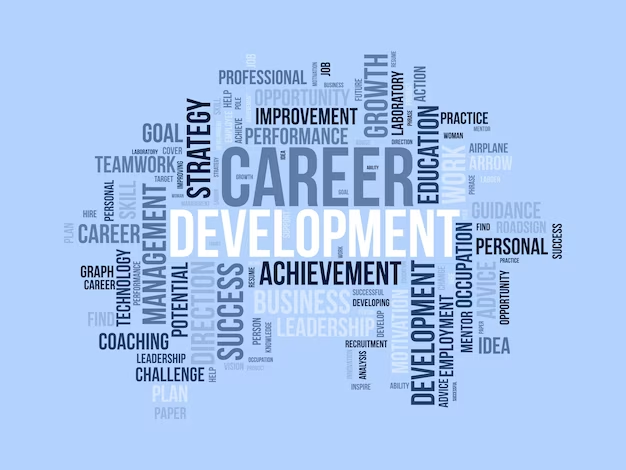Unlocking Your Professional Potential: A Comprehensive Career Development Guide for Long-Term Success

In today’s competitive job market, it is essential to have a clear path for professional growth and long-term success. Career development plays a vital role in unlocking your full potential and achieving your goals. It involves continuous learning, self-reflection, and strategic planning. By investing time and effort into your career development, you can open doors to new opportunities and enhance your professional brand. In this comprehensive guide, we will explore the key steps to unlock your professional potential and pave the way towards a successful career.
The importance of setting career goals
Setting clear and achievable career goals is the foundation of successful career development. Without a roadmap, it is easy to feel lost or stuck in your professional journey. Start by defining your long-term goals and break them down into smaller milestones. This will give you a sense of direction and purpose. Keep in mind that goals should be specific, measurable, attainable, relevant, and time-bound (SMART). Regularly revisit and reassess your goals to ensure they align with your evolving aspirations and circumstances.
Once you have set your career goals, create an action plan outlining the steps you need to take to achieve them. Break down each goal into actionable tasks, and set deadlines for each task. This will help you stay focused and motivated along the way. Remember that goals are not set in stone, and it is okay to adjust them as you gain more clarity about your interests and strengths.
Assessing your skills and strengths
To unlock your professional potential, it is crucial to have a deep understanding of your skills and strengths. Conduct a comprehensive self-assessment to identify your core competencies and areas for improvement. Reflect on the skills you have acquired through education, work experience, and personal interests. Additionally, consider seeking feedback from trusted colleagues, supervisors, or mentors. Their insights can provide valuable perspectives on your strengths and areas that need development.
Once you have a clear picture of your skills and strengths, focus on honing and expanding them. Take advantage of professional development opportunities, such as workshops, courses, or certifications, to enhance your skill set. Consider joining industry associations or networking groups to connect with like-minded professionals and stay updated on the latest trends and best practices. Continually seeking growth and improvement will not only boost your confidence but also make you a valuable asset to potential employers.
Identifying potential career paths
Exploring different career paths is crucial to unlocking your professional potential. Take the time to research and understand various industries, job roles, and opportunities available. Consider your interests, values, and skills when evaluating potential career paths. It is also beneficial to speak with professionals working in the fields you are interested in. Their insights can provide valuable information about the day-to-day realities of different careers and help you make informed decisions.
Once you have identified potential career paths, narrow down your options by assessing their alignment with your goals and values. Consider factors such as job prospects, growth opportunities, work-life balance, and potential earnings. Seek out informational interviews or job shadowing experiences to gain firsthand knowledge about the roles you are considering. This will help you make more informed decisions and increase your chances of finding a fulfilling career path.
Developing a career development plan
A career development plan is a roadmap that outlines the steps you need to take to achieve your professional goals. It serves as a guide and keeps you focused on your long-term vision. Start by setting specific objectives for each career goal you have identified. Break down these objectives into actionable steps and assign deadlines to each step. This will help you stay on track and measure your progress along the way.
In addition to setting objectives and timelines, it is essential to identify the resources and support you need to achieve your goals. This may include financial resources for further education or training, mentorship or coaching, or access to professional networks. Take the time to research and identify these resources, and create a plan to leverage them effectively. Regularly review and update your career development plan to ensure it remains aligned with your evolving aspirations and market trends.
Enhancing your personal brand
In today’s digital age, having a strong personal brand is essential for professional success. Your personal brand is a reflection of your unique skills, experiences, and values. It is how you present yourself to the world and how others perceive you. To enhance your personal brand, start by defining your professional identity. Identify your unique selling points and what sets you apart from others in your field. This could be a specific skill, a niche area of expertise, or a distinctive approach to problem-solving.
Once you have defined your professional identity, focus on building a strong online presence. Create a professional website or portfolio to showcase your work and achievements. Optimize your social media profiles to highlight your expertise and engage with relevant industry communities. Share valuable content, participate in discussions, and position yourself as a thought leader in your field. Regularly update your online presence to reflect your latest achievements and professional growth.
Continual learning and professional development
In today’s rapidly changing world, continual learning and professional development are crucial for staying ahead in your career. Embrace a growth mindset and seek out opportunities to learn and acquire new skills. This can include attending conferences, workshops, or webinars, enrolling in online courses or degree programs, or pursuing industry certifications. Stay updated on the latest industry trends and best practices by reading books, articles, and research papers. Additionally, consider joining professional associations or networking groups to connect with experts in your field.
Continual learning and professional development not only expand your knowledge and skills but also demonstrate your commitment to growth and adaptability. It positions you as a proactive professional who is prepared to tackle challenges and seize opportunities. Employers value individuals who are dedicated to self-improvement and are more likely to invest in their development.
Balancing work and personal life for long-term success
Achieving long-term success requires finding a balance between your professional and personal life. It is essential to prioritize self-care, maintain healthy boundaries, and manage your time effectively. Take the time to identify your priorities and allocate your time and energy accordingly. Set realistic expectations for yourself and avoid overcommitting or spreading yourself too thin. Remember that long-term success is not only about professional accomplishments but also about overall well-being and fulfillment.
To maintain a healthy work-life balance, establish boundaries between your professional and personal life. Set designated work hours and create a productive workspace that allows you to focus and minimize distractions. Prioritize self-care activities such as exercise, relaxation, and hobbies to recharge and prevent burnout. Finally, make time for meaningful relationships and activities outside of work. Cultivating a fulfilling personal life will not only contribute to your overall happiness but also enhance your professional performance.
Seeking mentorship and guidance
Mentorship and guidance play a crucial role in unlocking your professional potential. A mentor is someone who has achieved success in your field and can provide valuable insights, advice, and support. Seek out mentors who align with your career goals and values. They can help you navigate challenges, provide guidance on career decisions, and offer valuable networking opportunities.
In addition to formal mentorship programs, consider building a network of professionals who can serve as informal mentors. Attend industry events, join online communities, and engage in networking activities to connect with individuals who can offer guidance and support. Remember that mentorship is a two-way street, and it is important to reciprocate by providing value and support to your mentors when possible.
Resources for career development
There are numerous resources available to support your career development journey. Online platforms such as LinkedIn Learning, Coursera, or Udemy offer a wide range of courses and certifications to enhance your skills. Professional associations often provide resources, workshops, and networking opportunities specific to your industry. Additionally, career coaches or counselors can provide personalized guidance and support tailored to your unique needs. Take advantage of these resources to enhance your knowledge, skills, and professional network.
Conclusion
Unlocking your professional potential requires dedication, self-reflection, and strategic planning. By setting clear goals, assessing your skills, identifying potential career paths, and developing a career development plan, you can pave the way towards a successful and fulfilling career. Enhancing your personal brand, continually learning and growing, balancing work and personal life, and seeking mentorship and guidance are key ingredients for long-term success. Leverage the available resources and support to unlock your full potential and achieve your professional goals. Remember, your career development journey is unique to you, and it is never too late to invest in your professional growth. Start today and unlock the doors to a rewarding and successful career.



